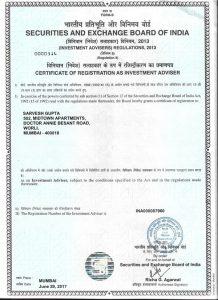Hope some of you had the time to read Berkshire Hathway 2017 Annual Report. It has a beautiful section in its printed page numbers 24-26 (PDF page numbers 26-28) on how Warren Buffett won a 10 year bet against one of the best fund of funds managers (glorified distributors/advisors) wherein Buffett had predicted that net of fees the average returns from best fund of fund managers wouldn’t be able to even beat the benchmark. Its outstanding to come to terms with the fact that globally 75% of the managers with the best of pedigree, education and connect with management as well all the resources be in human resource or money are not able to beat even the benchmarks over long term.
Buffett has expounded on these points beautifully and I am quoting and commenting on some of those I found very useful in terms of thinking about manager selection.
Quote 1
“I’m certain that in almost all cases the managers at both levels were honest and intelligent people. But the results for their investors were dismal – really dismal. And, alas, the huge fixed fees charged by all of the funds and funds-of-funds involved – fees that were totally unwarranted by performance – were such that their managers were showered with compensation over the nine years that have passed. As Gordon Gekko might have put it: “Fees never sleep.”
To put this simply, most of the industry works on the principle – “Heads and I (the fund manager) wins a lot & you the investor win as well But Tails and I still win but you loose even more that you should have”. The existence of only a fixed fee or a high fixed fee plus performance fee results in still great money in bad years and unreal money in good years for managers. This lopsided structure results in as per Buffett’s estimate almost 60% of the investor’s gross return being eaten up by managers (as mentioned in this annual report). My own sense of a fair share for the manager is not more than around 25% and that too only when the performance is above a certain high water mark and compounding hurdle rate.
Quote 2
“Under this lopsided arrangement, a hedge fund operator’s ability to simply pile up assets under management has made many of these managers extraordinarily rich, even as their investments have performed poorly.”
Again a very pertinent point, when you have existence of high fixed fee – it leads to creation of a very strong incentive to indulge in activities which will result in one’s assets under management going up rather than focusing on research and portfolio management which is the core of activity for a investment management operations. This is the reason one of the better-known managers discussed earlier spent a full day at ET NOW office post budget and is also very regular on twitter. Imagine, once I was trying hard to see an interview by Radha Krishan damani on Youtube and I was not able to find even one. Best of managers even outside of investment management business avoid being too salesy or media friendly cause they create value through their actions and not words. Just compare the number of media interactions of Aditya Puri with some of the PSU Bank managers and you would understand what I am saying. So wrong incentives – > lead to wrong actions -> bad results (especially when it comes to managing money but true elsewhere as well)
Quote 3
“Bill Ruane – a truly wonderful human being and a man whom I identified 60 years ago as almost certain to deliver superior investment returns over the long haul – said it well: In investment management, the progression is from the innovators to the imitators to the swarming incompetents.”
Here, Warren Buffett is quoting Bill Ruane, another truly outstanding manager and some of you might know that he is the founder of the legendary Sequoia Funds. This is a point which Warren hasn’t explained well in his letter but let me explain my sense of what he meant here.
One of the pitfalls of setting wrong fee structure and hence wrong incentives is that as a manager, your focus changes from generating high returns over the long term to managing expectations over the short term (this is the single biggest reason why majority of the MFs in India are already underpeforming the markets as per recent research). It is said that no manager has ever got fired buying IBM. It is also said that it is better for fund managers to fail conventionally than to succeed unconventionally. So what happens is that managers are all too focused on safeguarding AUMs (for instance who wants to take a contrarian call in that beaten down telecom stock, lets just focus on buying Dmart/Bajaj Finance – everyone is buying it and if it falls no investor can blame me for that, all likelihood investor would have some Dmart/Bajaj Finance in his direct holdings as well). This is why Bill Ruane says that you move from becoming a innovator in your early days to just an immitator (to protect the already high fee as % of AUM that you are enjoying) and hence incompetent soon.
Lack of contrarianism which is very difficult to do when you are constantly chasing more and more funds (as your fees is in proportion to funds rather than returns made for investors) is a major reason why smart people are not able to beat the benchmarks over the long term. If your views are more or less like the market, you will get more or less market returns and investors would do even worse because they still have to pay your high fees.
A corollary of my understanding of industry is also that is tremendously important for managers to keep their costs low as in most cases, managers operating out of swanky offices and paying to distributors to get assets all the time is a lot of cost which puts further emphasis on chasing AUMs. One of the most successful adviser of HNI assets (more than $1.5 Bn in assets in India) told me recently at an event that they are still unprofitable and under pressure to breakeven soon to do a listing (unsurprisingly they have also raised PE money). And this firm advises to some of the most well known families in India – I wonder about the quality and incentives of advice emanating from someone who can’t manage their own affairs and chase fee growth at any cost.
Quote 4
“Finally, there are three connected realities that cause investing success to breed failure. First, a good record quickly attracts a torrent of money. Second, huge sums invariably act as an anchor on investment performance: What is easy with millions, struggles with billions (sob!). Third, most managers will nevertheless seek new money because of their personal equation – namely, the more funds they have under management, the more their fees.”
I have written extensively on my other posts on why the law of gravity in investment management is that size of funds is inversely propotional to expected returns. This is where Buffett has mentioned three excellent reasons why it happens so. Only few investors who have the ability to successfully a) not over market, not chase funds and b) say no when you have enough in the interests of your investors over your own interests will be able to create high returns for their investors over the long term.
Unfortunately there won’t be another investor like Buffett is and this year’s letter like some of the previous ones ended in a rather morbid note as Buffett detailed his succession planing and how things will change at Berkshire post his death. I just hope that all of us are able to remember these pearls of wisdom and act accordingly while investing directly or indirectly. These lessons are true for all asset classes.

